Eerdmans Biblical Studies (10 vols.)
Digital Logos Edition
Get more books at a bigger discount when you order the Eerdmans Bible Reference Bundle!
Overview
The Eerdmans Biblical Studies collection offers 10 volumes designed to enhance your biblical and theological studies. This collection supports Bible study in both breadth and depth. Study the Bible in its entirety—survey the content of all the biblical books, explore connecting themes, investigate the cultural contexts, learn about each and every person mentioned in the Bible, and understand how the Bible was written. Go deeper with topical studies—delve into Scripture about the sacredness of human life, learn about the range and nature of the Holy Spirit’s gifts, understand how Scripture speaks about God’s character, analyze biblical perspectives on same-sex relationships, and apply biblical teachings on marriage to the modern world. Perfect for preachers, teachers, and students, the Eerdmans Biblical Studies collection equips you for thorough study.
With the Logos edition of the Eerdmans Biblical Studies collection, these powerful resources automatically integrate with your Logos library, allowing you to cross-reference them and study the Bible like never before. Pull these accessible texts up side-by-side with other commentaries in your library to compare interpretations and applications. Important terms, figures, and dates link to dictionaries, encyclopedias, the Timeline, and a wealth of other resources in your digital library. Logos mobile apps let you bring the discussion with you. With Logos Bible Software, the most efficient and comprehensive research tools are in one place so you get the most out of your study.
This title is included in the following collections
You can save when you purchase this product as part of a collection.
Eerdmans Biblical Studies (26 ...
$644.99$644.99Logos 8 Collector's Edition Le...
$11,399.99$11,399.99Logos 7 Collector's Edition Le...
$11,399.99$11,399.99Logos 8 Ultimate Legacy Librar...
$21,749.99$21,749.99
- $37,403.33$27,999.99

- Contains 10 biblical studies
- Encourages studying the Bible in both breadth and depth
- Provides applications for modern Christian living
- Title: Eerdmans Biblical Studies
- Publisher: Eerdmans
- Volumes: 10
- Pages: 3,835
- The Return of the Chaos Monsters—and Other Backstories of the Bible by Gregory Mobley
- A Cultural Handbook to the Bible by John J. Pilch
- How the Bible Was Built by James W. Bennett and Charles Merrill Smith
- The Holy Spirit—In Biblical Teaching, through the Centuries, and Today by Anthony C. Thiselton
- The Unrelenting God: Essays on God’s Action in Scripture in Honor of Beverly Roberts Gaventa edited by David J. Downs and Matthew L. Skinner
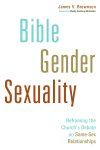
This thought-provoking book by James Brownson develops a broad, cross-cultural sexual ethic from Scripture, locates current debates over homosexuality in that wider context, and explores why the Bible speaks the way it does about same-sex relationships. Fairly presenting both sides in this polarized debate—“traditional” and “revisionist”—Brownson conscientiously analyzes pertinent biblical texts and helpfully identifies “stuck points” in the ongoing debate. In the process, he explores key concepts that inform our understanding of the biblical texts, including patriarchy, complementarianism, purity and impurity, and honor and shame. Central to his argument is the need to uncover the moral logic behind the text.
With gentle wisdom Brownson reveals an implicit moral logic beneath scriptural teachings about sexuality and same-sex relationships. His insights—which are both prophetic and pastoral—build a much-needed bridge across the sexual divide that separates people of shared biblical faith.
—David G. Myers, professor of psychology, Hope College
Jim Brownson has written what I believe is a game-changing book on the hotly disputed topic of same-sex orientation and relationships in light of the Bible. He approaches the biblical texts with no less care and respect than the most conservative or traditional scholars, but he makes overt and clear what many seem unconscious of—the moral logic that operates in a text. By surfacing and grappling with that moral logic, Brownson can explore the why behind the what of biblical prohibitions. In so doing, he provides not only a masterful work on human sexuality in light of Scripture, but also a model for the kind of robust and faithful biblical hermeneutic that our churches desperately need at this point in our history.
—Brian McLaren, pastor, author, activist, and speaker
Fascinating and incredibly helpful. It would be hard to suggest that Brownson is anything other than meticulous, transparent, and authentic in his treatment of the issues and of scripture.
—Englewood Review of Books
James Brownson is James I. and Jean Cook Professor of New Testament at Western Theological Seminary, Holland, Michigan. His other books include Speaking Truth in Love: New Testament Resources for a Missional Hermeneutic
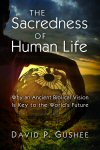
In The Sacredness of Human Life, David Gushee traces the concept of the sanctity of human life from Scripture through church history to the present day, arguing that viewing human life as sacred is one of the most precious legacies of biblical faith. Besides providing a masterful historical survey, Gushee’s discussion covers the many current ethical challenges and perspectives that impact the flourishing of human life, including biotechnology, the death penalty, abortion, human rights, nuclear weapons, just war theory, women’s rights, and creation care.
David Gushee is one of the preeminent Christian ethicists in the country, and his work is important for both those in the academic world and all of us trying to live out obedient and biblical lives. In The Sacredness of Human Life he rescues this most spiritual of concepts from the narrow realm of political rhetoric, which it has come to inhabit in recent years. This book should be read by anyone who desires to reclaim a broader definition of how ‘the sacredness of life’ should truly be understood.
—Jim Wallis, editor-in-chief, Sojourners
No one, to my knowledge, has come up with a deeper or more sustained account of what it means to say that human life is sacred than David Gushee in this magisterial work.
—Jeremy Waldron, professor of law, New York University School of Law
This is the most significant book I have ever seen about what it really means to say that human life is sacred. It combines conservative loyalty to preserving the sacredness of human life with liberal loyalty to caring for the basic needs of life. . . . Gushee’s work can bring the healing we need in our time of dangerous polarization.
—Glen Stassen, Lewis B. Smedes Professor of Christian Ethics and the Executive Director of the Just Peacemaking Initiative, Fuller Theological Seminary
In the face of today’s heated debates over ethical issues, Gushee does a fine job of laying out so-called progressive, conservative, and other Christian perspectives. This book is a valuable resource for all those who want to understand and thoughtfully engage perspectives other than their own.
—John F. Kilner, Franklin Forman Chair of Ethics, Trinity International University
David Gushee is one of the most important theological ethicists writing today, and this book is a landmark for future work in Christian ethics. If you are interested in fundamental moral and theological concepts, or in the character of religious discourse in our public life, or in the future health and sanity of the Christian churches in the USA (and beyond), you owe it to yourself to read this book.
—Charles Mathewes, Carolyn M. Barbour Professor of Religious Studies, University of Virginia
David P. Gushee is distinguished university professor of Christian ethics and director of the Center for Theology and Public Life at Mercer University, Atlanta, Georgia. He is also the author of The Righteous Gentiles of the Holocaust, Kingdom Ethics, and The Future of Faith in American Politics.
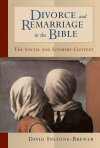
To many, the New Testament’s teaching on divorce and remarriage seems both impractical and unfair. The plain meaning of the texts allows for divorce only in cases of adultery or desertion, and forbids remarriage until the death of one’s former spouse. But are these proscriptions the final word for Christians today? Are we correctly reading the scriptures that address these issues?
By looking closely at the biblical texts on divorce and remarriage in light of the first-century Jewish and Greco-Roman world, David Instone-Brewer shows that the original audience of the New Testament heard these teachings differently. Through a careful exploration of the background literature of the Old Testament, the ancient Near East, and especially ancient Judaism, David Instone-Brewer constructs a biblical view of divorce and remarriage that is wider in scope than present-day readings.
David Instone-Brewer is senior research fellow in Rabbinics and the New Testament at Tyndale House, Cambridge, and a member of the divinity faculty at the University of Cambridge and the British Association of Jewish Studies.
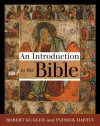
Introduction to the Bible provides a survey of the content of all biblical books, section by section, focusing on the Bible’s theological themes. Rather than introducing students to the Bible merely as history, literature, a record of political or ideological history, or a testimony to societies living or dead, authors Robert Kugler and Patrick Hartin stress that the Bible must be read as the text presents itself, as a theological witness to the nature of God and of humanity in relationship with God. Perfect for undergraduates, church study groups, and interested laypeople, Kugler and Hartin’s Introduction to the Bible ably delivers on its title.
Two veteran teachers and distinguished scholars have joined forces to present a solid and up-to-date introduction to both the Hebrew Bible and the New Testament. They are especially effective in showing how to read the Bible on the literary, historical, and theological levels. Their work is ideal for a college course, personal study, and long-term reference.
—Daniel J. Harrington, professor of New Testament, Boston College School of Theology and Ministry
This fine introductory volume does precisely what it sets out to do: it presents readers with an outline of what to look for as they make their way through the biblical text. The commentary does not overpower the reader with scholarly theories; instead it allows the reader to confront the text as it stands.
—Gary A. Anderson, Hesburgh Professor of Catholic Theology, University of Notre Dame
Can there be anything new under the sun by way of introductions to the Bible? I find this contribution by Robert Kugler and Patrick Hartin well planned and brimming with useful maps, charts, questions, frameworks, and art. It’s clear that these two authors are competent guides for our students, and they make a familiar journey fresh for instructors as well.
—Barbara Green, professor of biblical studies, Dominican School of Philosophy and Theology, Graduate Theological Union
This comprehensive, thoroughly informed, and lavishly illustrated volume, produced by the collaboration of two experts—one Protestant, one Catholic—achieves that to which it aspires: it is clarity itself. This is the perfect introduction for undergraduates.
—Dale C. Allison Jr., Richard J. Dearborn Professor of New Testament Studies, Pittsburgh Theological Seminary
Onto the crowded shelf of introductions to the Bible comes this welcome addition. Acknowledging that much of the Bible is narrative witness to a people’s experience of God, the authors add two things that set this textbook apart from others. They incorporate narrative criticism into their approach to the biblical texts, without, however, neglecting the results of historical-critical methods; and they identify the theological claims made by each biblical book.
—Susan A. Calef, assistant professor of New Testament, Creighton University
Robert A. Kugler is Paul S. Wright Professor of Christian Studies at Lewis & Clark College, Portland, Oregon.
Patrick J. Hartin is professor of religious studies at Gonzaga University, Spokane, Washington.
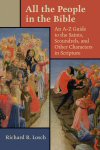
A comprehensive gathering of persons found in the Bible, including the Apocrypha, All the People in the Bible delivers on its title: literally all of the Bible’s characters appear in this fascinating reference work. From the first article on Aaron to the final entry on Zophar, Richard Losch details each person in a lively narrative style.
Richard Losch has written much more than just another ‘name book.’ What he has given us is really a commentary on the Bible, seen through the unique focus of the human players in the biblical story. His comprehensive work is meticulously researched, accurately presented, and fascinatingly written. All pastors should add this impressive volume to those books they keep in reach—it will be in constant use.
—Clyde E. Fant, Jr., professor emeritus of religious studies, Stetson University
Richard R. Losch is retired rector of St. James’ Episcopal Church in Livingston, Alabama
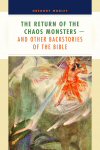
In The Return of the Chaos Monsters—and Other Backstories of the Bible, Gregory Mobley plunges beneath the Bible’s surface to reveal its “backstories”—the tales that constitute the backbone of the people of Israel and of the body of Christ. Viewing the Bible as “essentially, relentlessly story,” Mobley provides an easy-to-understand seven-part thematic overview of the Bible that guides readers through the drama of the Hebrew Bible, highlighting the interconnectedness of biblical stories. Each story is a variation on a single theme—the dynamic interplay between order and chaos.
In lively prose Greg Mobley combines the work of teacher and preacher, scholar and poet to explore the dominant story line undergirding the Bible. His passion for the subject guides the reader into mystery and mayhem, law and love, nature and nourishment. A book worthy of the informed faith it espouses.
—Phyllis Trible, university professor, School of Divinity, Wake Forest University
Mobley has written a thick narrative account of Israel’s thick narrative. He does so with freedom and imagination while remaining faithful to the plotline of the old narrative. His book defies genre classification; it is part introduction, part theology, but mostly a playful tease that invites the reader into the indeterminate wisdom of the biblical text. Mobley’s shrewd reflection on ‘God’s anger’ is itself well worth the price of the book. But there is much more here that invites fresh thinking about texts we thought we already knew. This welcome and suggestive probe of biblical imagination ranges all the way from the stories of the ancient Near East to quite personal narrative memories.
—Walter Brueggemann, William Marcellus McPheeters Professor of Old Testament Emeritus, Columbia Theological Seminary
The Bible was composed by storytellers, and, nearly alone among commentators, Mobley brings the Bible’s narrative world, often an oral narrative world, to life.
—Lawrence M. Wills, Ethelbert Talbot Professor of Biblical Studies, Episcopal Divinity School
Gregory Mobley is professor of Christian Bible at Andover Newton Theological School and was a recipient of the Society of Biblical Literature’s Regional Scholar award. An ordained American Baptist minister, he is active in promoting Jewish-Christian relations in the Boston area. His other books include The Empty Men: The Heroic Tradition of Ancient Israel.
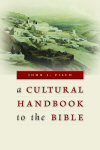
The task of interpreting the Bible—a book written by and to people living in very different cultural contexts from contemporary Western society—can seem monumental. The opposite is also true: people can easily forget that studying the Bible is a type of cross-cultural encounter, instead reading their own cultural assumptions into biblical texts.
In A Cultural Handbook to the Bible, John Pilch bridges this cultural divide by translating important social concepts and applying them to biblical texts. In accessible chapters Pilch discusses 63 topics related to the cosmos, the earth, persons, family, language, human consciousness, God and the spirit world, and entertainment. Pilch’s fresh interpretations of the Bible challenge traditional views and explore topics often overlooked in commentaries. Each chapter concludes with a list of useful references from cultural anthropology or biblical studies, making this book an excellent resource for students of the Bible.
A Cultural Handbook to the Bible is a splendid resource for teachers (at any level), preachers, and general readers seeking to bridge the gaps (geographical, historical, social, cultural) separating us today from biblical times and everyday life in antiquity.
—John H. Elliott, professor emeritus of New Testament, University of San Francisco
From beginning to end, John Pilch breaks the cultural world of the Bible wide open, enabling readers along the whole theological spectrum to be more considerate readers of texts that derive from a social system vastly different from our own. With this aid at their side, readers of the Bible will avoid common misinterpretations of biblical terms, symbols, behaviors, values, and more. This is a must-have resource for theologians, preachers, and students.
—Joan C. Campbell, professor of New Testament studies, Atlantic School of Theology
Pilch’s Cultural Handbook to the Bible is so interesting that readers will find it hard to stop reading. Very accessible for a wide range of readers—college students, seminarians, theologians, laypersons. . . . Materials from this book would give lots of fizz and snap to sermons.
—Jerome H. Neyrey, professor emeritus of New Testament studies, University of Notre Dame
In a highly accessible style yet with deep and wide scholarship, John Pilch, an international authority on the biblical social world, leads us, like a trustworthy tour guide, through the highways and byways of the ancient world. Thanks to his work, the Bible becomes alive to us again as God’s Word in human words. I most strongly recommend this handbook to both scholars and general readers.
—Peter C. Phan, Ellacuria Chair of Catholic Social Thought, Georgetown University
Once more Pilch has given us what we have come to expect from him—thorough knowledge from Middle Eastern and Mediterranean cultures giving new and unexpected insights into the texts of the Bible. Short essays on a wide range of topics provide answers to the curious Bible reader, and bibliographies give students tools to pursue their own explorations into the fascinating world of the Bible. This is a book to enjoy and learn from!
—Halvor Moxnes, professor of New Testament studies, University of Oslo
John J. Pilch is visiting professor in the Odyssey Program at Johns Hopkins University, Baltimore, and was adjunct professor of biblical literature at Georgetown University for 18 years.
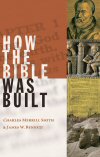
The Bible continues to be the world’s best-selling book. But few people could say just how its writings—stories, letters, poems, legal code, and vivid prophecy—were brought together. How the Bible Was Built clearly tells the story of how the Bible came to be.
Written by Charles Merrill Smith in response to his granddaughter’s questions, the manuscript was discovered after Smith’s death and has been reworked by his friend James Bennett for a wider audience. Free of theological or sectarian slant, this volume provides a factual overview of the Bible’s construction throughout history, outlining how its various books were composed, collected, canonized, and translated.
James W. Bennett is the award-winning author of several young adult novels, including Old Hoss and The Squared Circle, as well as the spiritual memoir A Quiet Desperation.
Charles Merrill Smith was a United Methodist minister and is the well-known author of such books as How to Become a Bishop without Being Religious, When the Saints Go Marching Out, and the Reverend Randollph mystery series.
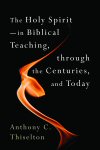
This book by eminent scholar Anthony Thiselton is a detailed biblical, historical, and contemporary study of the Holy Spirit. Thiselton presents an up-to-date account of biblical teaching on the topic, including exposition of passages and hermeneutics; offers a comprehensive historical survey from the Apostolic Fathers to Jonathan Edwards; and engages a host of modern theologians.
Thiselton closes by discussing a remarkably wide range of writings on the Holy Spirit from the nineteenth century to the present day. He interacts with Pentecostals and the Renewal Movement in a positive, yet critical manner. The book as a whole is at once scholarly and readable, comprehensive and practical.
Magisterial! Brilliant! Erudite! Anthony Thiselton offers a sure-handed overview of the biblical teachings on the Spirit, maps the major historical streams of pneumatological reflection, and charts the important trajectories going forward. . . . This book bridges heretofore divergent polemics and opens up new dialogical horizons and possibilities for the contemporary theological task.
—Amos Yong, dean of the School of Divinity, Regent University
In this crucial and practical work Thiselton provides expert guidance through the variety of topics pertinent to a theology of the Holy Spirit. . . . I know of nothing comparable. This volume is something every pastor and student should have in his or her library.
—Klyne Snodgrass, professor of biblical literature, North Park Theological Seminary
Respectfully engages a wide range of literature. Even cessationists and classical Pentecostals, who will argue with various elements, will find numerous points valuable for reflection and exegesis. All will appreciate and profit from the helpful engagement with secondary literature and survey of historical perspectives.
—Craig S. Keener, professor of New Testament, Asbury Theological Seminary
I have often thought that I would like to round off my writing career with a fuller or more complete study of the Holy Spirit. Rather to my relief I need no longer champ at that bit. Tony Thiselton has already done it and left me nothing to do. Thank you, Tony.
—James Dunn, Lightfoot Professor of Divinity Emeritus, University of Durham
Anthony C. Thiselton is professor emeritus of Christian theology at the University of Nottingham, England.
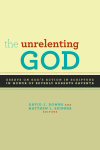
In The Unrelenting God, accomplished scholars in the fields of biblical and theological studies explore ways in which Scripture speaks about God’s character and God’s activity in the world. As honoree Beverly Roberts Gaventa has done throughout her career, the contributors address important and nuanced theological themes such as God’s dramatic invasion of the world in the Gospel of Jesus Christ, God’s ultimate triumph over the powers of sin and death, and humanity’s ongoing participation with God in Christ.
Contributors
- Joel B. Green
- Douglas Harink
- Richard B. Hays
- L. Ann Jervis
- Jacqueline E. Lapsley
- J. Louis Martyn
- William Sanger Campbell
- Francis Watson
- Shane Berg
- Martinus C. de Boer
- Alexandra R. Brown
- David J. Downs
- Susan Grove Eastman
- John B. F. Miller
- Matthew L. Skinner
- Katherine Sonderegger
- Michael Welker
David J. Downs is associate professor of New Testament studies at Fuller Theological Seminary, Pasadena, California.
Matthew L. Skinner is associate professor of New Testament at Luther Seminary, Saint Paul, Minnesota.
Reviews
0 ratings